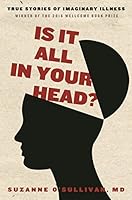
It's All in Your Head

How easily we accept these different facets of laughter. It is a physical display of emotion, its mechanism is ill-understood, it is not always under our voluntary control, it affects our whole body, it stops our breathing and speeds up our heart, it serves a purpose, it releases tension and communicates feelings. Laughter is the ultimate
... See moreSuzanne O'Sullivan • It's All in Your Head
be. For people to accept the reality of psychosomatic illness they must accept the power of the mind over the body. We seem to be happy to accept reports of people using hypnosis in place of anaesthesia, the placebo effect, the use of sports psychologists, homeopathy and alternative medicines, the effect of meditation and cancer diets and any
... See moreSuzanne O'Sullivan • It's All in Your Head
A Norwegian study asked over 900 consecutive patients at a GP practice if they thought they suffered with any of the following: amalgam poisoning, irritable bowel syndrome, candida syndrome, chronic fatigue syndrome, fibromyalgia, electromagnetic poisoning or food intolerance. Each of these diagnoses is considered either entirely medically
... See moreSuzanne O'Sullivan • It's All in Your Head
Sometimes, for everything that is lost through illness, there is also something that is gained. Even disability can be difficult to relinquish if the gain is sufficient. But this too is an unconscious process.
Suzanne O'Sullivan • It's All in Your Head
On the face of it, women turn their distress inward and men turn it outward.
Suzanne O'Sullivan • It's All in Your Head
In irritable bowel syndrome, one explanation is that the sufferers have abnormal gut motility and an oversensitivity to foodstuffs and stimulants that leads to their symptoms. Another argument says IBS is in fact a disorder of perception, that those affected are overly observant of every internal sensation and change in their bowel motions. They
... See moreSuzanne O'Sullivan • It's All in Your Head
Situations that make people feel trapped appear particularly likely to lead to somatic illness.
Suzanne O'Sullivan • It's All in Your Head
There is evidence to suggest that people who have anxious or neurotic personalities, those with a tendency to worry or feel anger, guilt and depression, are more likely to develop somatic complaints.
Suzanne O'Sullivan • It's All in Your Head
Sometimes people appear to behave in a way that brings them unhappiness or harm. People create arguments where none are necessary. They stay in abusive relationships when they could escape. They give up their ambitions for seemingly little reason. Behaviour that seems irrational might make more sense if you could appreciate the purpose it serves.
... See more